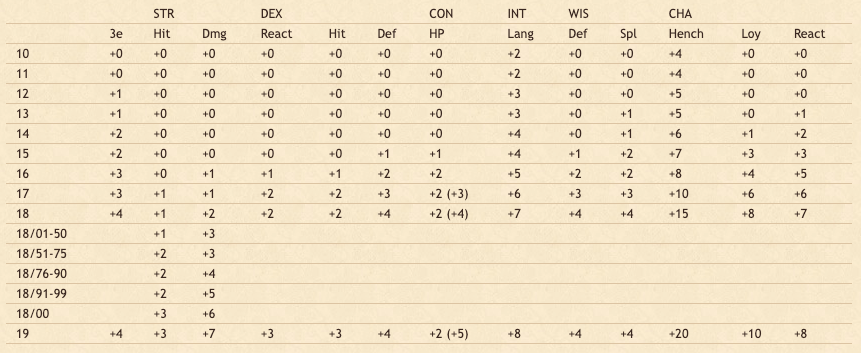While translating AD&D 2nd Edition into a d20 OGL styled combat was easy, the translation of Non-Weapon Proficiencies is proving to be a bit more difficult. The mechanic itself is easy – the DM assigns a target result, and the player rolls d20 and adds their modifiers. The DM’s target is easy, as it’s laid out very plainly in the d20 ruleset. Additionally, it is easy to assign a +1 for each NWP slot a character has put into a proficiency. The problem comes in applying an ability modifier.
In the d20 implementation of the 3e ruleset, WotC created a single modifier table for all abilities. An ability score of 10 or 11 was considered to be perfectly average, with no bonus or minus. For each pair of points about that, the character received a +1 to their Skill Check (the 3e version of an NWP). So, a character with a 12 or 13 receiving a +1 to the appropriate skill check, and a character with an 18 or 19 received a +4.
For comparison sake, below is a table of the d20 OGL 3e ability score bonus and the various 2e AD&D bonuses:
From here the question becomes, which bonuses to use. Rather than move to a single bonus table (as in 3e), I am choosing to keep with stat specific bonuses. This keep the inherent balance (or imbalance, as per your opinion) in 2e.
I’m assuming a max stat of 18, and figuring it’s a rarity in 2e, since stats don’t increase with levels. So, an exceptionally high bonus would be rare indeed. Most stats have a bonus that falls in line with the +4 bonus granted at an 18 in 3e.
For strength, I would choose the damage modifier, and take exceptional strength into account. This exceptionally high bonus would be rare, and only available to fighter classes. Additionally, I would use the exceptional hit point bonus for fighters, when considering a constitution-based bonus.
My only real concerns are with intelligence and charisma. Using the number of languages for intelligence means that almost everyone would get a bonus. Even an intelligence of 10 would have a +2 modifier. And, it would mean an intelligence of 18 would get a +7 – quite high indeed.
One option is to subtract two from this value. It would start the bonus with a stat of 12, and max out at a +5 with the 18. This would fall in line with an assumption that most people know two languages. They would know common and a racial language (for demi-humans), or common and a regional language (for humans). Anything beyond that is truly excpetional.
Charisma is all that is left. Number of henchmen is out, based purely on the scope of the bonuses. Loyalty Base doesn’t appeal to me either, due to its non-linear nature and the high end-state. Reaction adjustment is a bit more linear, and falls in line with using either “adjustments” or “reaction” modifiers from other stats.
So, we have a basic d20 mechanic: Roll + # slots + ability bonus. Now, it’s just a matter of settling on the final bonuses. I will be playtesting the different options in my current campaign.





How did rule this end up? Are you still playing 2e?